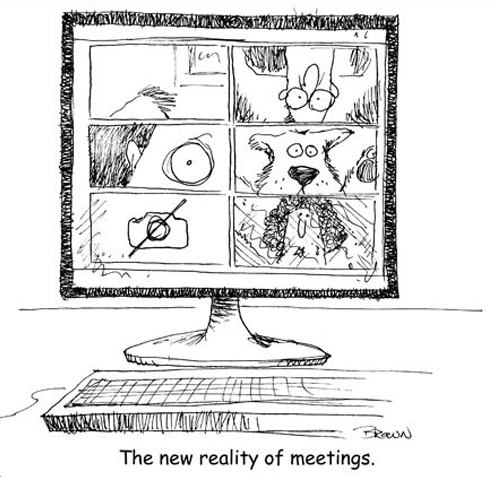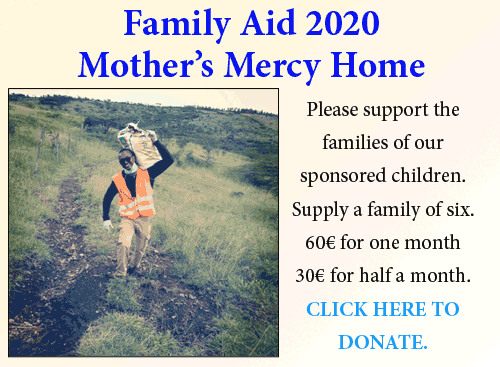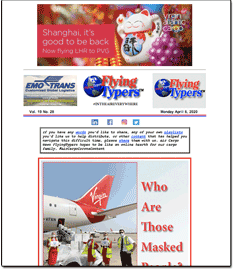|
Rick
Elieson moves easily from his vocation as the President of American
Airlines Cargo to his avocation as a brilliant naturalist photographer.
These days we imagine Rick working
from the sanctuary of home in the embrace of family and photos,
continuing to think big thoughts as he pilots the cargo fortunes
of the biggest airline in the world.
Here he shares an inside look at his
professional and personal life today, and some idea what we all
might expect from air cargo moving ahead in 2020.
FT: What
has surprised you?
RE: We
need to lend all the support we can to developing treatments for
COVID-19, and our air cargo industry plays a part in making that
happen. We should all find great meaning in our role. But I believe
we also need an increased measure of empathy, compassion, and respect
for diversity so that this disease doesn't divide and conquer us.
History will judge, and perhaps this
can only be understood on a longer horizon, but I worry that there
is an arc of xenophobia underlying many of the developments we've
seen around the world for many years, which is now being exacerbated
by fears of contracting an infectious disease. In some respects,
people underestimate the risk of catching it from their neighbor,
and seem to overestimate the risk of catching it from a neighbor
who looks different than themselves. This disease is taking a terrible
toll, but it is absolutely temporary. Mankind and the brotherhood
of man is enduring.
FT: What
does the shipper value most?
RE: Demand
for passenger travel has dissipated so quickly that our published
schedule reductions haven't been able to keep up. This has meant
a lot of additional cancellations that have created uncertainty
for customers. Directly addressing that uncertainty with better
information around tracking or being able to stand behind operational
guarantees mitigates some of that.
Our recent Fair Booking Policy also
helps to ensure efficient use of limited available capacity. But
this is a significant level of disruption for the entire industry
that goes beyond operational disruption. I find it easy to slip
into language like "unprecedented" or "unrivaled"
but the truth is that industries are disrupted all the time. We
can look around us right now and see potential paradigm shifts for
in-person education, hotels/Airbnb, automotive, movie production
or even big tobacco.
I am convinced that the key to resilience
lies in adaptation and a focus on quality rather than efficiency
or cost savings. In American's case, this has only fueled our enthusiasm
for our IT modernization project and the flexibility that it will
create for our customer and our business.
FT: How
do you spend your days? Are you home? If so will this be the new
way to do business?
RE: Many
of our team members are working remotely now, but many more are
putting on their uniforms and coming to work each day. We are members
of an industry that is critical to putting food on people's tables.
And we play a role in the delivery of life-saving pharmaceuticals
that has never been more front-and-center than it is in the fight
against COVID-19 by delivering treatments, test kits, supporting
clinical trials, as well as PPE. We have an awesome responsibility.
Much of what we do is behind the scenes,
but it isn't taken for granted. To the contrary, awareness of our
role in connecting the world and caring for people on life's journey
has probably never been greater.
FT: Do
you cook? Have a favorite recipe?
 RE:
While we are all getting reacquainted
with our kitchens (and I can't find butternut squash in my local
grocery anymore!), I am deeply concerned about the ability for small
businesses to cope with the effects of social distancing on their
business. That goes double for the family owned restaurants in my
neighborhood. So, I am trying to support them as much as I can.
I had a second, long conversation last night with the owners of
my favorite Thai restaurant. This time I got up the courage to urge
them to lower prices, improve their website, offer delivery service,
promote their cleaning regimen, simplify their menu, offer daily
specials of grab-and-go items or free promotional dishes for orders
above the average ticket price, ask people to pay in cash, and put
up a much bigger open sign! These aren't new tactics, or even new
opportunities for them, but the urgency to change how they think,
and their willingness to try new approaches has suddenly and drastically
changed. There is probably a lesson there for all of us. RE:
While we are all getting reacquainted
with our kitchens (and I can't find butternut squash in my local
grocery anymore!), I am deeply concerned about the ability for small
businesses to cope with the effects of social distancing on their
business. That goes double for the family owned restaurants in my
neighborhood. So, I am trying to support them as much as I can.
I had a second, long conversation last night with the owners of
my favorite Thai restaurant. This time I got up the courage to urge
them to lower prices, improve their website, offer delivery service,
promote their cleaning regimen, simplify their menu, offer daily
specials of grab-and-go items or free promotional dishes for orders
above the average ticket price, ask people to pay in cash, and put
up a much bigger open sign! These aren't new tactics, or even new
opportunities for them, but the urgency to change how they think,
and their willingness to try new approaches has suddenly and drastically
changed. There is probably a lesson there for all of us.
FT: Are
you reading a book?
RE: I
am always reading a book. Instilling in my children a love for reading
is perhaps the one thing I know I've gotten right as a parent! At
a time when we are all over-saturated by media headlines, many of
which are designed to tantalize rather than inform, I think escaping
into a book - any book - is great therapy right now. I probably
get through about 40 books a year and in March I read three that
I liked; Creativity Inc., The Toyota Way, and Give and Take. I found
nuggets and similarities in each that are shaping the way I think
about my responsibilities and how I can have a more positive impact
on my business.
FT: What
and who is your inspiration?
RE: Recently
I have found inspiration in the works of W. Edwards Deming. He was
an engineer and statistician who is often credited with the rise
of the Japanese auto industry after WWII. His contributions are
usually ascribed to quality in manufacturing and helping companies
to leverage data in their decision making. That is surely true,
but I have been inspired by the application of his principles to
creating a more safety-conscious culture. Not just safe policies
or practices, but how to instill it within the very culture. This
is something I'm quite interested in and have enjoyed thinking about.
FT: What
are you telling friends and love ones and possibly business partners
about coping in these times?
RE: I
have three things written on a post-it and stuck to my computer
monitor as reminders of how to succeed in a period with so much
uncertainty.
1.
Stay positive. One of my favorite
quotes is from Jeff Holland who said, “No circumstance is
so bad that complaining about it won’t make it worse.”
I’m not perfect at this, but I am trying. It is helpful to
remember that my circumstances don’t need to define my attitude,
and there are plenty of great things occurring all around us. My
happiness is not the product of success, but rather that a good
attitude drives motivation, hard work and ultimately, success will
follow. Don’t get the sequence backwards and think that you
can only be happy after things turn out well. It is also helpful
to remind myself that this crisis is a momentary one. The first
ingredient is a good attitude followed by working as a team.
2.
Unify as a team. In our annual
employee survey, teamwork and collaboration consistently rank at
the top of attributes that define our organization. Especially in
the world of social distancing, we need to remain connected and
unified in purpose. Recognition helps, as does significantly ramping
up communication so that as priorities shift, we shift together
as a team.
3.
Adapt. I was a Boy Scout, so of course
I am a believer in being prepared. And American is as well-prepared
as one could reasonably expect. But no one is very good at predicting
the future and preparation doesn’t solve problems, it just
extends the time available to you. We often simplify Charles Darwin’s
work on natural selection as “survival of the fittest”
but the lesson we should take away is “survival of the most
adaptive.” We must not just embrace, but drive change in our
organizations in response to changing customer expectations. I could
talk about all day about how to do this!
FT: What
plans that were previously made have worked well as the pandemic
has deepened?
RE: Our
Cargo Strategy team maintains a “disruptors and adjacencies”
playbook that was helpful in getting cargo-only flights operating
quickly. Obviously, it doesn’t predict every scenario, but
it pre-digests some of the more complex issues of which we could
conceive and helped us to identify commonalities and successful
approaches so that we aren’t flat-footed even in unforeseen
circumstances.
The other process we’re relying
on is following the example of our IT teams who are really good
about reprioritizing and reallocating resources. They disband and
reform teams all the time based on the changing needs of the organization
they support. We’ve begun doing the same; throwing out old
reporting lines and team structures and forming new ones centered
around our most pressing objectives. Teams are small, largely autonomous,
in constant contact (virtually of course!), and focused on fast,
incremental results. As our needs change - and what isn’t
changing right now – we spool up a new team or disband an
old one.
We even created a team to help match
available resources with unmet opportunities. Our recent Fair Booking
Policy was the product of one of those teams – a need emerged
to make sure that at a time when we have so little capacity, our
customers can take advantage of every inch. It was an initiative
that didn’t exist prior to the pandemic, a cross-functional
team was quickly formed to tackle the issue, and now that the work
is complete, the team will disband to go work on a variety of other
projects.
I am optimistic about the work ahead
of us and our ability to create positive, lasting change.
Geoffrey
|







